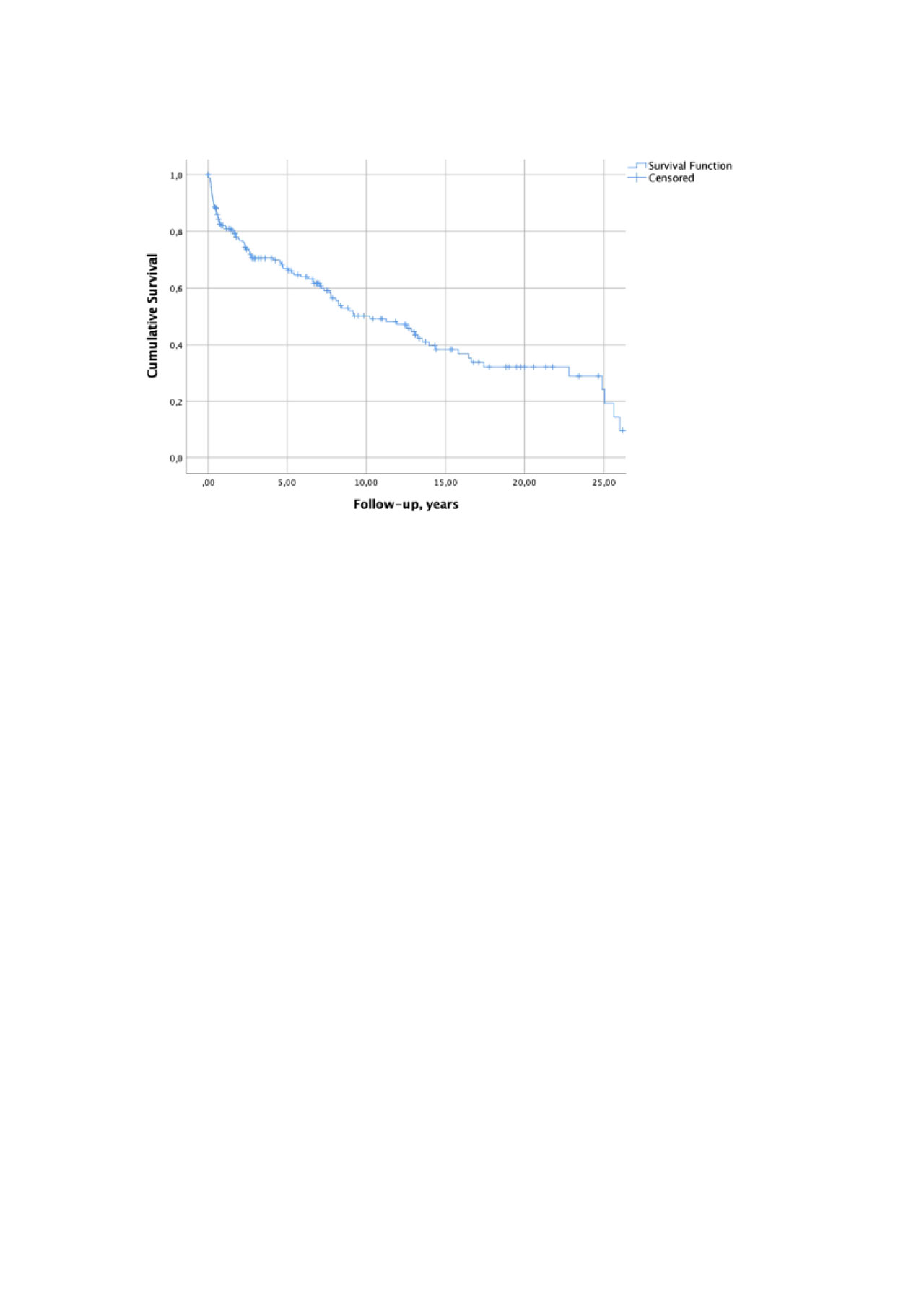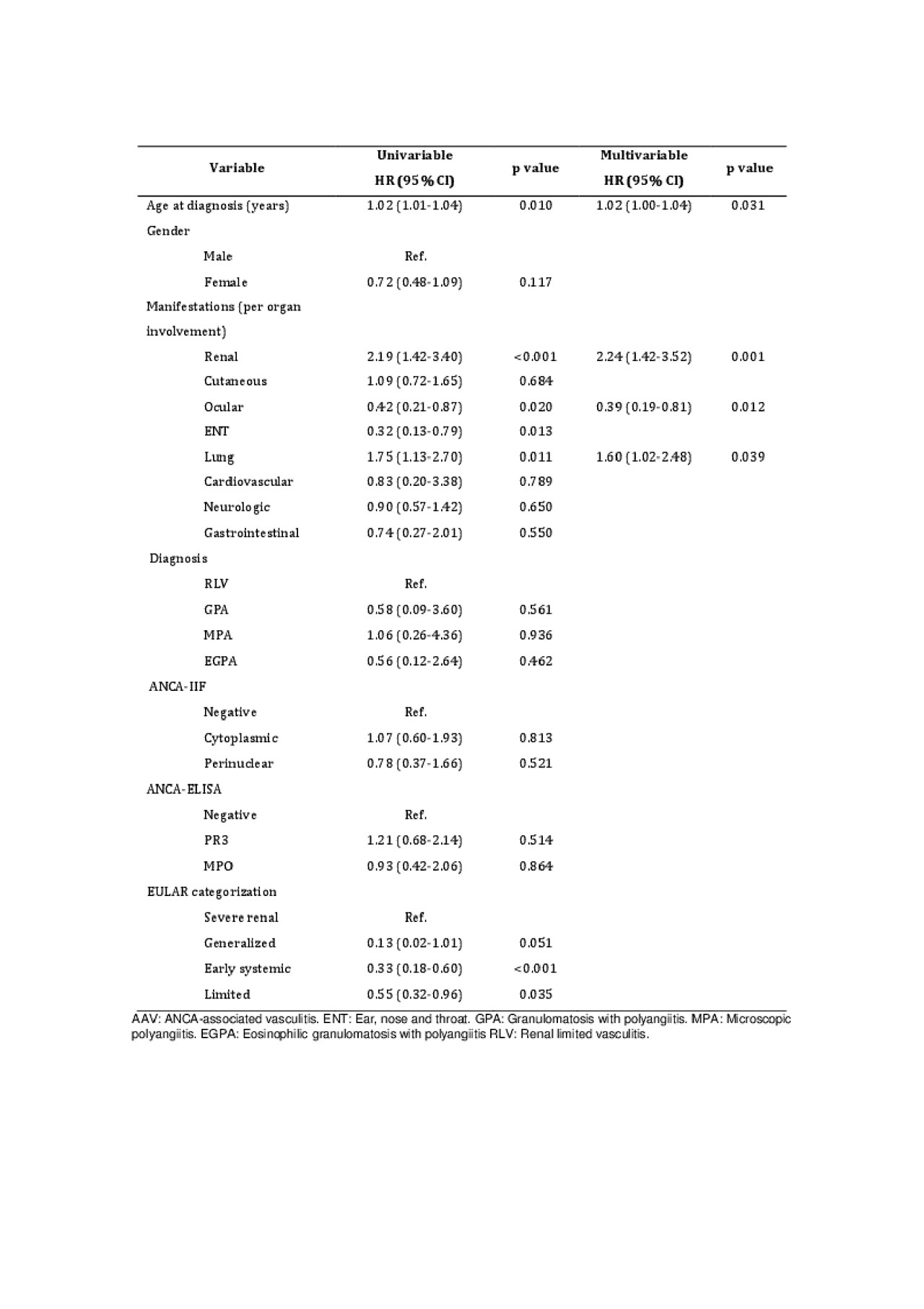Session Information
Session Type: Poster Session (Monday)
Session Time: 9:00AM-11:00AM
Background/Purpose: To identify demographic and clinical risk factors for mortality in patients with ANCA-associated vasculitis (AAV) who were followed-up in a Latin-American Tertiary Referral Hospital.
Methods: Medical records of patients with AAV according to the 1990 ACR criteria, Chapel Hill 2012 consensus, EMEA criteria, or diagnosed by an experienced rheumatologist, and covering the period between January 1990 and December 2018, were reviewed. Granulomatosis with polyangiitis (GPA), microscopic polyangiitis (MPA) and eosinophilic granulomatosis with polyangiitis (EGPA) were included. Renal limited vasculitis (RLV) was considered separate from MPA. Features analyzed as potential predictors of mortality were demographic factors (age at diagnosis, gender), disease duration, clinical manifestations (per organ involvement), creatinine level at diagnosis (mg/dl), ANCA status [by method (ELISA or IIF)], diagnosis, and EULAR disease categorization (limited, early systemic, generalized and severe renal). Categorical variables were summarized as frequencies and percentages while continuous variables were presented as medians and their interquartile ranges (IQR). Cox regression models were used to determine the risk factors for mortality. Univariable and multivariable analyses using a backward selection method with α-level to stay in the model set at 0.05 were performed. Statistical analyses were performed using SPSS v26.0.
Results: One hundred eighty-nine patients were included with a female/male ratio of 2:1 [127 (67.2%)/62 (32.8%)]. Their median (IQR) age at diagnosis and disease duration were 60.0 (51.5-68.5) and 4.7 (1.0-11.1) years, respectively. One hundred forty-six (77.2%) patients had MPA, 32 (16.9%) GPA, 5 (2.6%) EGPA and 6 (3.2%) RLV. One hundred seventy-eight patients had ANCA-IIF results [p-ANCA: 119 (66.9%), c-ANCA: 38 (21.3%), negative-ANCA: 21 (11.8%)] and 172 patients had ANCA-ELISA results [MPO: 117 (68.0%), PR3: 31 (18.0%), negative-ANCA: 24 (14.0%)]. According to EULAR categorization, 5 (2.6%) were limited, 67 (35.5%) were early systemic, 88 (46.6%) were generalized and 29 (15.3%) were severe renal. The last two categories had a median (IQR) creatinine level of 1.4 (0.9-2.7) and 8.0 (6.7-10.1). Until April 2019, 96 (50.8%) patients had died. The corresponding Kaplan-Meier survival curve is depicted in Figure 1; five-year survival was 66.9%, ten-year survival was 50.1% and twenty-year survival was 32.0%. Ocular involvement was protective [HR 0.39 (CI95% 0.19-0.81), p=0.012] while renal involvement [HR 2.24 (CI 95% 1.42-3.52), p=0.001], lung involvement [HR 1.60 (CI95% 1.02-2.48), p=0.039] and age at diagnosis [HR 1.02 (CI95% 1.00-1.04), p=0.031] were predictive factors of mortality (Table 1).
Conclusion: Ocular involvement was protective while age at diagnosis and renal and lung involvements were predictive factors of mortality in Latin-American AAV patients. At ten years of follow-up, the survival rate was 50%.

Kaplan-Meier survival analysis-convertido
To cite this abstract in AMA style:
Pimentel-Quiroz V, Sánchez-Torres A, Acevedo-Vásquez E, Gamboa-Cárdenas R, Reátegui-Sokolova C, Medina-Chinchón M, Zevallos F, Noriega E, Alfaro-Lozano J, Cucho-Venegas J, Sánchez-Schwartz C, Rodríguez-Bellido Z, Perich-Campos R, Pastor-Asurza C, Alarcón G, Ugarte-Gil M. Survival in ANCA-Associated Vasculitis in a Latin-American Center: 28 Years of Experience [abstract]. Arthritis Rheumatol. 2019; 71 (suppl 10). https://acrabstracts.org/abstract/survival-in-anca-associated-vasculitis-in-a-latin-american-center-28-years-of-experience/. Accessed .« Back to 2019 ACR/ARP Annual Meeting
ACR Meeting Abstracts - https://acrabstracts.org/abstract/survival-in-anca-associated-vasculitis-in-a-latin-american-center-28-years-of-experience/

